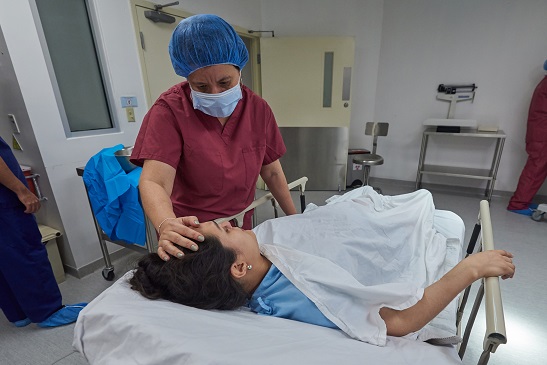Resuming Elective Procedures: How Will It Work?

By Debra Wood, RN, contributor
As some states resume elective procedures, questions remain as to how those surgeries can proceed safely while the coronavirus pandemic continues to rage in certain parts of the country.
“It’s about getting people treatment in a timely manner,” said Mary Dale Peterson, MD, president of the American Society of Anesthesiologists.
Resuming surgeries also would generate needed revenue for hospitals and likely would bring healthcare professionals and other employees previously furloughed and/or without assignments, back to patient care.
“It will get nurses and physicians back to being employed, and it will help patients,” Peterson said. “I think it’s a good thing. We believe it can be safely done and it’s time to go into our next phase.”
Summer Bryant, DNP, RN, CMSRN, president-elect for the Academy of Medical–Surgical Nurses (AMSN), has talked with nursing colleagues across the country who are also looking forward to the next phase, feeling that resuming elective procedures will bring back a certain normalcy to healthcare organizations.
Recommendations for resuming surgeries
On April 17, 2020, the Association of periOperative Registered Nurses, American College of Surgeons, American Society of Anesthesiologists and the American Hospital Association issued a joint statement, titled Roadmap to Resuming Elective Surgery After COVID-19 Pandemic. The authors predict the pent-up demand for elective procedures “may be immense.”
“We have to create a safe environment for healthcare workers and our patients,” Peterson said. “The recommendations we have come up with can help make that happen.”
Texas, Oklahoma, California and Alaska governors are already giving the go-ahead or will soon for elective procedures.
Once public health officials authorize the return of elective surgeries, the organizations involved with the Roadmap to Resuming Elective Surgery After COVID-19 Pandemic recommend a sustained14-day reduction in new COVID-19 cases before proceeding with elective surgeries. Additionally they recommend that the facility maintain enough intensive care and regular beds; sufficient personal protective equipment (PPE) to handle a second COVID-19 wave, ventilators, medications and other supplies; along with trained staff to safely care for patients.
The Roadmap also recommends testing patients and staff for COVID-19, with accurate and available tests, to protect healthcare workers and patient safety.
However, Peterson acknowledged that testing ability remains less than ideal. Therefore, the Roadmap recommends distancing, controlling access and wearing appropriate PPE.
“Where we can do it, [testing] might be helpful to patients and their decision making,” Peterson said, for instance, if the patient tested positive for COVID-19, delaying the surgery until he or she has recovered.
Cancer surgeries, transplants, cardiac procedures and trauma cases should move to the front of the line, based on American College of Surgeons’ guidelines in the Roadmap. The statement authors noted that elective surgery cases should be prioritized using an objective scoring system.
“Everybody has to look at their surgical schedule and work with their surgeons to prioritize those [surgeries] that have been postponed,” Peterson said. “There are categories of patients who should get high priority.”
The Centers for Medicare & Medicaid Services (CMS) also released guidelines for resuming elective procedures. Their guidelines include setting up zones for patients without COVID-19 and keeping staff caring for COVID patients separate from caring for patients without the disease. Once adequate testing capability is available, CMS advises that patients and staff members be tested for the coronavirus.
What are hospitals doing?
“Palomar Health of San Marcos, California, will follow guidelines established by the federal government and the American Hospital Association to begin non-emergent surgeries in the near future, assuming conditions continue trending in a positive direction,” said Derryl Acosta, manager of public relations for the health system.
“As a hospital system we are committed to serving our community and keeping our staff safe,” said Palomar Health Chief Medical Officer Omar Khawaja, MD. “We will begin non-emergent surgeries as soon as it is safe to do so, which includes testing patients for COVID-19 and proper personal protective equipment for staff.”
Some health systems, such as Henry Ford Health System in Detroit, which furloughed a large number of employees in March, are now performing surgeries and scheduling “time-sensitive” procedures.
Tommy Ibrahim, chief physician executive at Integris Health in Oklahoma, told Modern Healthcare that cardiac and oncology procedures will come first, when surgeries resume. But PPE and medication availability is holding the health system back.
Lisa Brandenburg, president of UW Medicine Hospitals & Clinics in Seattle, plans to begin performing “urgent” surgeries and planning for elective surgeries starting May 18, 2020. Every patient is being tested for COVID-19, and in the hospital, UW keeps patients with COVID-19 separate from other units. Staff members with symptoms are sent home.
“A critical piece of this is patients feeling safe returning to the hospital,” Brandenburg said.
TravelNursing.com has thousands of rapid respond travel nursing jobs available across the country. Browse our extensive database.
Sources:
https://www.facs.org/covid-19/clinical-guidance/roadmap-elective-surgery
https://www.cms.gov/files/document/cms-non-emergent-elective-medical-recommendations.pdf